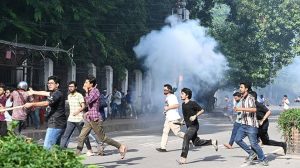
Since Dr. Yunus assumed power on 8 August 2024 as the Chief Adviser of the Interim Government, the country has been witnessing a seesaw reaction towards him and his government. The majority of these reactions are virtual, while a small fraction appears in the print media.
In one of his earliest speeches as CA, Dr. Yunus assured the nation that the freedom of speech was to be exercised to the full. He urged the critics to exercise this right and blast him to their hearts’ content. Many of his frontline enemies, including those who support the previous regime, have used videos, mostly out of context, to vilify him and term him a misfit for the job he had undertaken. This pattern was further aggravated by some private channels from India, which manufactured fake and incriminatory video and audio content to incite communal disharmony. But as none of this content had any real substance, the campaign gradually died down. However, this section of critics mainly accuses Dr. Yunus of having no expertise for the job and no mandate from the people.
In this essay, I will address these two objections raised by this vicious quarter to determine whether they are worth considering.

First of all, the question about expertise. Dr. Yunus has massive expertise in economics, and the world recognizes it. Professor Serajul Islam Chowdhury, for example, is an expert on literature, and the nation knows it. But the political culture that we indulged in for so long has given power to rule to those who can be judged as neither the best kind of people to lead the nation, nor qualified to conceive what ruling a nation democratically really means. Take a historical stock of the people who ruled us, except for a handful of them, you will hardly find anyone to reckon with.
Dr. Yunus may not have the expertise to rouse the people emotionally with his speech at a public meeting, the ready wit to make a politically apt retort, or the vulgarity to degrade himself to the level of using insane and disgusting remarks about his political opponents. But his lifelong experience in dealing with poverty has certainly given him an understanding of the basic pulse of the people, who do not want political rhetoric, nor a bellyful of false assurances; they want food, sleep, and peace, and Dr. Yunus is enormously efficient in this sector.
As this section of critics insinuates, political expertise is based on a political career and a lengthy background in party politics. But the reality is just the opposite, as our political history shows: it is full of political chicanery and empty rhetoric. Well, it has been quite the basis of party politics for a long, long time. But this faith in tradition, in the demagogical potency, has subtly given way to a more rigorous objectivity in postmodern political societies, which this body of critics fails to perceive.
The July revolution may be taken simply as a movement against fascism, but its far-reaching consequences may be considered a substitution of subjectivism for objectivism. Subjectivism has a holy place in our national consciousness because it is aligned with the spirit of the liberation war, with the idealism of non-communalism, and the elimination of mass poverty from the state of the golden Bengal. But subjectivism/idealism may be distorted and used in a deviated sense from the original values for which they stood. This happened in the name of party politics and party rule for so long that the system needed to be changed, and the revolution just did it. In the name of this or that ideology, the nation was divided into two or more than two camps. In a democratic society, dissenting voices and counter politics, when they are accommodated, often strengthen the fabric, which is an optimistic projection for a country. However, in a garboiled democratic system, dissent is not tolerated. The intolerance of the opposition peaked abnormally during the past regime.

Let’s take a tolerant view of our country’s socio-political history. We must admit that it has been a mixture of two past cultures—the Vedic culture of ancient India and the Middle Eastern culture after the arrival of Islam in this land about eight hundred years ago. The communal harmony embedded in our cultural consciousness cannot and should not be toyed with by the political parties whose ideologies seem to oppose this harmonious subtext. Neither should this be used by so-called secular parties as trump cards.
I was speaking about objectivity and why Dr. Yunus’s government should be viewed from this perspective. Apparently, objectivity is more connected with the reality of society than subjectivity, which is often less a substance than a pose. In a corrupt political system, subjectivity or pretentiously holding on to enshrined values may villainously act as a cover for encouraging fraud, money laundering, extortion, illegal occupation of properties, share market scams, and night stuffing during a national election. These corruptions are connected with ultra-compromise with financial rules, but all were continuously practiced and authoritatively executed in the name of ideologies. All these took place unhindered during the previous regime, thus offsetting many of its glorious achievements, like the Padma Setu and Chittagong Expressway to the airport, just to name a few.


In this respect, Dr. Yunus’s arrival on the scene should be seen as a blessing because his expertise in economics and the wide range of experience he earned through Grameen Bank operations should enable him and his team to pinpoint the limping areas and to cure them by implementing outcome-based policies. The two Eids passed successfully, and though the prices of commodities have an up-and-down swinging pattern, they still look well-managed. Foreign reserves have increased, and so has foreign aid. The only area where Dr. Yunus’s expertise has been challenged is in curbing the rise of mobocracy. In his recent visit to the UK, he admitted to the media that when the statue of Bangabandhu was dismantled, the situation, in this initial phase, was not within his control. That was true in the early stages, but by now, the government should be able to impose laws and order to keep the public in peace.
Thus, political expertise does not come from a scripted legacy; it is contingent on the people who deal with it. Dr. Yunus’s handling of power must be characterized by his own wisdom and expertise.
This brings me to another aspect of my argument. When debating subjectivity and objectivity, I took note of Facebook entries of many of my friends and acquaintances, who can be considered sensible people with the right mindset. I noticed that many of them actively participated in the hate campaign against Dr. Yunus.
Why? I paused and thought. Then a perception gleamed through. I have observed that our so-called elite and educated society suffers from a hangover of cultural entities that were evacuated of significance a long time ago through real circumstances.
One of the cultural entities we have so adorably clutched close to our hearts is that money is the root of all evil. So, they want to see a division between money and, let us say, culture (education, literature, etc.). Our National Poet Quazi Nazrul Islam emphatically confirmed this idea when he uttered, “O poverty, you’ve made me noble.” Our classical literature is also imbued with the idea that the poorer you are, the better you are.
Interestingly, Dr. Younus’s innovation of the ‘small credit system’ can be seen as a method with anti-capitalist implications. However, I am aware of the criticism against it, as it does not quite frequently relieve the borrower from the loan shackles.
What I am trying to say is that societies now uphold money in a positive light. When the reality of money is recognized against the false stance that money is evil, an idea that merely acts as a propagandist tool for the people who held power in the previous regimes, then things will be put in clearer perspective.
My sense of objectivity is that the Interim Government may awaken a genuine perception that money is important and should not be taken as a ploy to hide behind different non-monetary ideologies, increasing the scope for mass exploitation.
Let us call a spade a spade and be shorn of all false rhetoric, and Dr. Yunus’s role should be understood in these objective terms.

Mohit Ul Alam
Mohiut Ul Alam, a Shakespearean scholar, is the former vice chancellor of Jatiya Kabi Kazi Nazrul Islam University at Trishal, Mymensingh. He was also Professor of English at Chittagong University, Dean of English and Humanities Department, University of Liberal Arts Bangladesh, and the founder Chairman of Department of English Literature and Language, Premier University, Chittagong. Mohit Ul Alam has more than thirty books to his credit – fiction, poetry, and nonfiction, including books on teaching English. In addition, he has written columns published in Bangla and English dailies addressing current issues. He was a syndicated sports-columnist for Prothom Alo during the World Cup Soccer (2010) and ICC Cricket World Cup in 2011, respectively. He has been the editor of the academic journal Crossings: ULAB Journal of English Studies.


